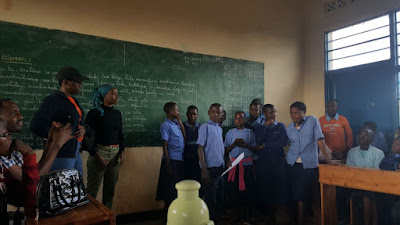Rimba Creations is a team of 15 women who are former sex workers now making jewellery together and street vending as a way of making a living.
Our first meeting with the members of Rimba was on a Tuesday morning. We started by introducing ourselves; we took time to learn about them, their families and what it is they do so that we could get to know each other. By the end of the session, the women were teaching
the UKVs the traditional 'cow dance' of Rwanda. It was a great meeting that we all enjoyed.
 |
| Volunteer Jemima and Liliane working the Rimba Creation ladies |
Time to make something productive...
Since the first meeting, the only way has been up! We meet with the Rimba women every Tuesday morning to aid with making jewellery or discuss with them to find solutions to any issues that may arise. One of our volunteers, Jemima, put forward the idea to produce different items such as waist beads, ankle bracelets and personalised wrist bracelets. So we purchased the necessary materials and taught the Rimba ladies how to make them. This turned out to be a successful idea as more and more orders were coming in. The Rimba women were so excited to see a profit being made from their products, giving encouragement to work even harder.
We are now
in week 9 and the improvement has been great! They now arrive to work on
time and those who can't make it always communicate with the president of the cooperative. Now, it's clear to see that the women of Rimba trust each other and feel like one team working towards their goal. However, there is still room for improvement in
some areas: producing things of high demand on the market and marketing their products well.
 |
| Examples of different waist bead designs handmade by Rimba Creations |
Production and Selling
The previous cohort had found a shop in Huye where they can sell their jewellery. This shop already stocks similar products to the earrings and necklaces they were previously making which is why we decided to diversify their range by making waist beads and anklets. This is a trend more popular in West Africa than East Africa, so this should give them their own niche in the market. Additionally, the waist beads are quicker and easier to make which we hope will increase their productivity and, in turn, their profits.
The previous cohort had found a shop in Huye where they can sell their jewellery. This shop already stocks similar products to the earrings and necklaces they were previously making which is why we decided to diversify their range by making waist beads and anklets. This is a trend more popular in West Africa than East Africa, so this should give them their own niche in the market. Additionally, the waist beads are quicker and easier to make which we hope will increase their productivity and, in turn, their profits.
 |
| Examples of handmade personalised bracelets by Rimba Creations |
It has taken
a long time to bring Rimba Creations together. They have been working with LUTI
and ICS volunteers for four cohorts now, but we feel that we have finally found a
solution to their issues, giving them a sustainable way for them to make money
in the future.
For now, they are still dependent on the accountant of LUTI - Yvette - who still helps them to collect their weekly contributions and deal with their bank account. However, we hope that in the near future one or several of the women will be able to undertake an accounting course in order to be able to deal with their finances on their own.
For now, they are still dependent on the accountant of LUTI - Yvette - who still helps them to collect their weekly contributions and deal with their bank account. However, we hope that in the near future one or several of the women will be able to undertake an accounting course in order to be able to deal with their finances on their own.
By Jemima Kakizi and Gianne Pineda
Edited by Keziah Lewin
Photos by Gianne Pineda



























